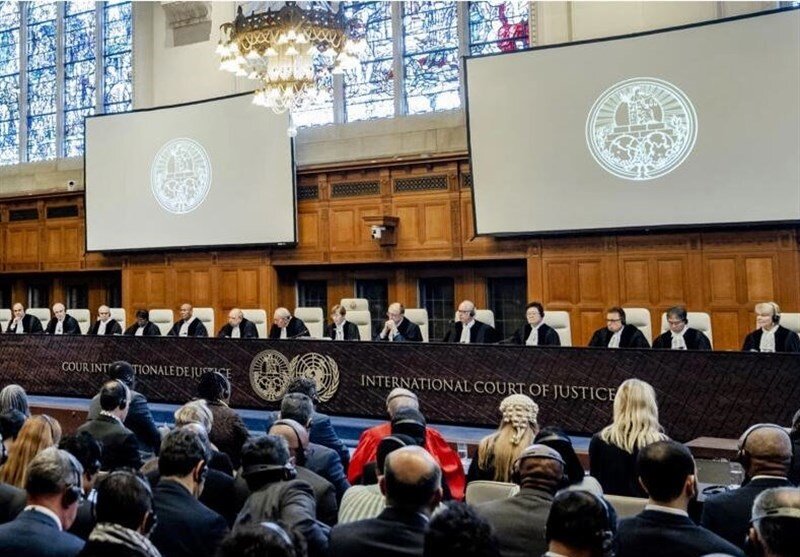Iran urges rapid halt to Israeli atrocities against Palestinians

TEHRAN- Reza Najafi, Iran’s Deputy Foreign Minister for Legal and International Affairs, has noted that Israel’s atrocities against the Palestinians must end immediately.
On Thursday, Najafi read Iran’s statement during oral proceedings before the International Court of Justice (ICJ) on the legal ramifications of Israel’s occupation of Palestinian lands.
While emphasizing Iran’s long-standing principled position in support of the Palestinians’ inherent right to self-determination and non-recognition of Israel, the Iranian representative also highlighted the disastrous situation in the besieged Gaza Strip, citing reports from international organizations and aid agencies.
The Iranian envoy expressed optimism that the court’s reasonable ruling will create the foundation for saving the lives of thousands of innocent women and children in the occupied Palestinian territory.
He went on to add, “We remain at a turning point in the history of mankind; the opinion of this Court can set the ground for saving the lives of thousands of innocent women and children, and contribute to the legitimate demand of a people deprived of its inherent right to self-determination for decades.”
“Needless to say, forcible displacement of civilian population, is of such a high significance that has been defined as a war crime under Article 8 of the Statute of the International Criminal Court.”
In another part of the statement, the highest UN court was advised that having a national vote is the only legitimate and democratic option to decide the fate of Palestinians.
“In the Islamic Republic of Iran’s view, the only legal, practical, democratic and just method to effectively realize the inherent right to self-determination of the Palestinian people is to hold a national referendum in Palestine. The details of this plan are contained in an official document of the United Nations issued in 2019,” Najafi continued.
The Iranian envoy also said, “There are legal consequences arising from the prolonged occupation of the Palestinian territories by the Israeli occupying regime in violation of the right of the Palestinian people who have never experienced the right to self-determination.”
“Having elaborated on the legal consequences that arise for all States and the United Nations from this status, I will reiterate the inclusive plan previously submitted by the Islamic Republic of Iran to the United Nations for the realization of the right of Palestinians to self-determination,” Najafi stated.
The top UN court is conducting its fourth day of hearings against Israel’s decades-long occupation of the Palestinian territory. Representatives from many nations have addressed the Hague-based court.
Following a UN request, the tribunal is convening a week of public hearings, during which 52 nations will offer their positions on the topic of a nonbinding ruling on the legal ramifications of Israel’s occupation of the Palestinian territories.
The present hearings are connected to a complaint launched by the UN General Assembly after a resolution passed in December 2022.
On January 26, the ICJ delivered its ruling on the emergency measures requested by South Africa in its genocide case against Israel over its war on the Gaza Strip.
At a meeting with Francis Molloy, South Africa’s new ambassador to Tehran, in January, Iranian President Ebrahim Raisi said that Tehran backs South Africa’s “smart and historic” decision to bring a lawsuit against Israel at the ICJ for crimes against the Palestinians in the beleaguered Gaza Strip.
“South Africa’s move in complaining about the crimes of the Zionist regime (Israel) is a historic, lasting and commendable action and the Islamic Republic of Iran supports this smart and wise action,” Raisi said.
Additionally, Raisi praised the “very good and advancing” relations between the two nations, saying that nothing can stop the development of such connections.
Also, the Iranian foreign minister praised South Africa for its victory in the ICJ against Israel.
In his commendation, Hossein Amir Abdollahian extended congratulations to South African Minister of International Relations and Cooperation Naledi Pandor.
Highlighting Tehran's unwavering support for Cape Town's initiative, Amir Abdollahian emphasized, "Once again, I underscore the backing of the Islamic Republic of Iran for the efforts of the South African government."
He went on to denounce Israeli officials as the "most reviled" figures in public opinion, attributing this sentiment to their involvement in genocide and unprecedented war crimes against Palestinians.
The minister asserted that justice should prevail, urging that those responsible for such actions be held accountable.
He underscored the enduring impact of Israeli war crimes, affirming that they will not be forgotten and will continue to be pursued by global public opinion.
In alignment with Iran's position on the South Africa case, the minister called on counterparts worldwide to support the South African initiative within the ICJ.
Since Israel’s occupation of Palestine in June 1967, the unlawful entity has committed numerous crimes against Palestinians, including murder, displacement, detention, and torture, as well as the demolition of their houses.
Since the onset of the Gaza conflict, Israel’s main backer, the United States, has rejected UN Security Council resolutions calling on the regime to stop its ruthless aggression.
